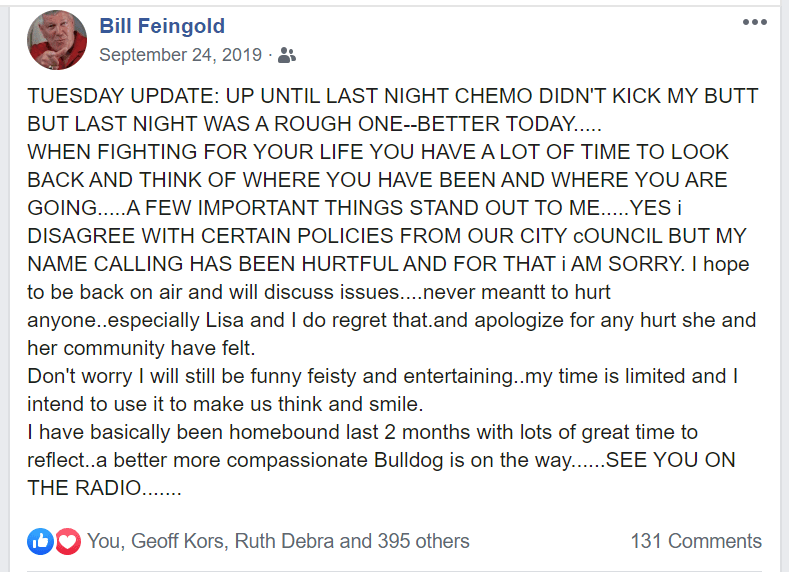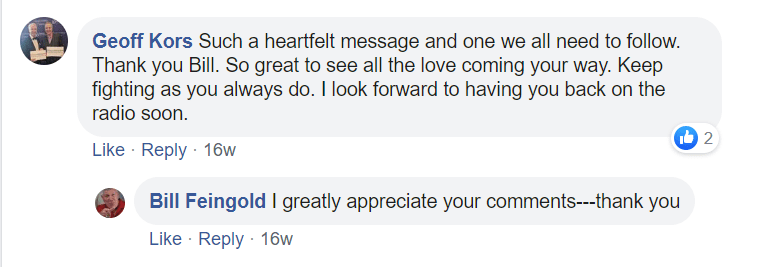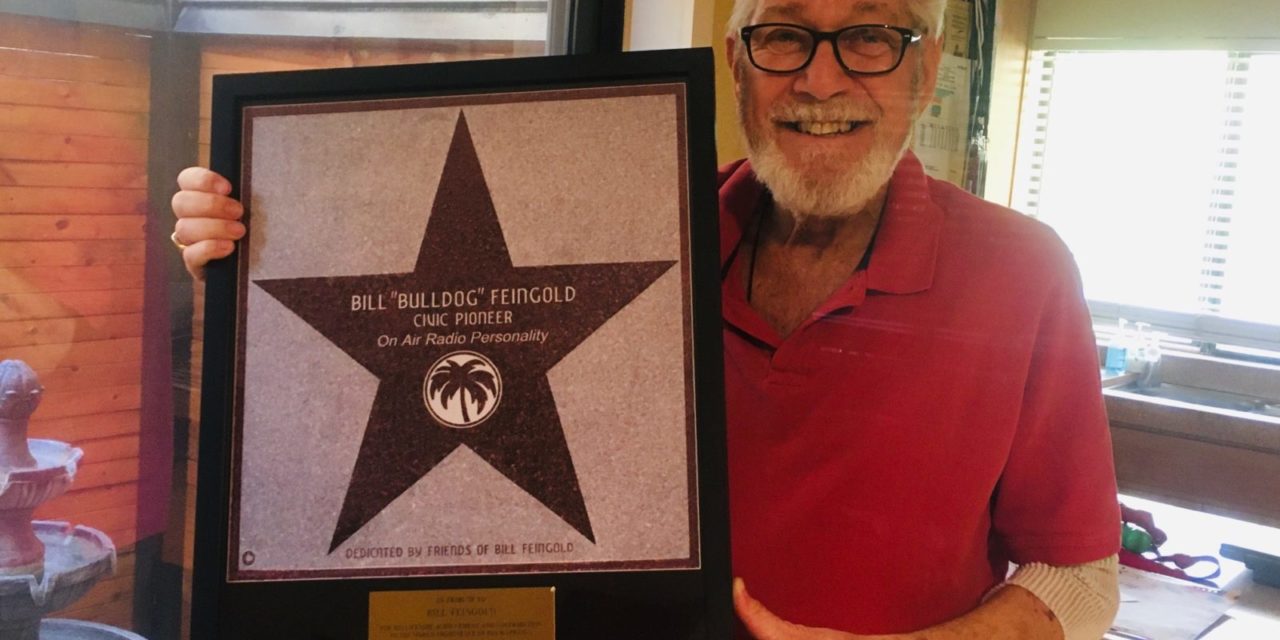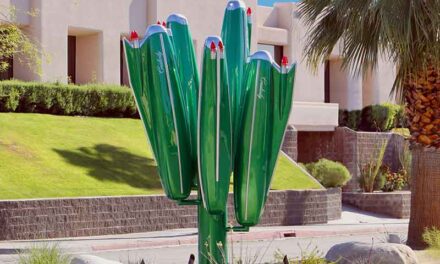PALM SPRINGS – Bill “Bulldog” Feingold, the beloved host of a highly popular radio talk show who is living with Stage 4 liver cancer, has vowed to fight for residents’ right to directly elect the community’s mayor.
“I’m not going to die until I get my vote back,” Feingold told Uken Report. “I don’t know what’s worse, getting cancer or having them take my vote away. Both things are aggravating me to death.”
Saying he does not have strength to do it on his own, Feingold has issued a public plea for people to help him launch a petition drive. To date, more than two dozen people have offered to help him. Feingold is also considering suing the city upon advice from some authors of the original mayoral ordinance. He declined to identify his advisers.
Feingold, 70, maintains that the only reason the City Council voted to rotate the mayor’s position among members of the City Council was to “get rid of Mayor Rob Moon.”
Listen to him make his argument in his own words by clicking here.
Feingold, who continues to receive chemotherapy, said now that his star is “in cement” on the Walk of Stars in downtown Palm Springs, timing is right for the petition drive.
“They’re going to get theirs,” Feingold said. “The payback is, that unfortunately for them, I didn’t die. I mean it. There is a time to drop politics.”
He is referring in large part to those he alleges tried to prevent him from getting his star – primarily Mayor Geoff Kors and City Councilmember Lisa Middleton. Feingold claims their surrogates admonished him to publicly apologize to for calling them names on his radio show or his star would be jeopardized and possibly even spark a massive protest from the transgender community.
He would often refer to Middleton as “Mrs. Doubtfire” and to Kors as “Howdy Doody.”
The president of the United States calls people names, Feingold said.
“But, OK, it was wrong and I apologized. I’m on death’s doorstep and I’m getting text messages from the Chamber of Commerce saying it can’t order the stuff and that the transgender community doesn’t like me and will protest.”
Feingold said he has long supported the transgender community, “but they need to get a sense of humor once in while. They have none.”
As he fought for his life, dropped 40 pounds and appeared skeletal, he received a text from someone he declined to identify saying, “You’re in deep doo-doo. They’re really after you. Kors and Middleton. If that’s all they have to do with their life … it’s inhumane.”
He says his on-air partner, Kevin Holmes, was hearing the chatter and so was former Mayor Moon, who both can vouch for him. Holmes and Moon had heard of the efforts long before Feingold. They did not tell him because he was so ill.
“That’s really, really inaccurate,” Chamber CEO Nona Watson said of Feingold’s allegations. “If you understand the process, no one could stop it. Bill’s star was in the making before he got sick. He had to go through the process and it takes time. I manage the Walk of Stars. I would know if someone tried to stop it. It makes me feel bad that Bill would think someone would try to stop it.”
“I at no time commented on whether or not Mr. Feingold or anyone else was deserving of a star on the Walk of Stars,” Middleton told Uken Report. “I do not believe anyone on the City Council should play a role in who receives a star on the “Walk of Stars.”
Additionally, when Paul Lewin, a member of the Chamber Board of Directors asked for her thoughts, Middleton said she declined to weigh in. Middleton made history in Palm Springs in November 2017 by becoming the first transgender person elected to a non-judicial office in California.
Kors fully acknowledged that he thought Feingold should apologize for what he described as Feingold’s “hateful and transphobic” language, but he had no desire —and made no effort — to stop’s Feingold from being recognized on the Walk of Stars.
On Sept. 24, Feingold issued a public apology on Facebook to those he hurt, especially Middleton. Kors acknowledged  the apology and commented on it.
the apology and commented on it.

On Oct. 14, his star was dedicated. Kors attended.
The star, according to Feingold was former Mayor Rob Moon’s idea. The two are close friends.
“I’m putting this all out because, one, I want to get the vote back,” Feingold said. “That’s more important. Two, I want people to know how rotten they are. I don’t want anyone voting for them to think these are wonderful people. They’re not. They’re just not.”
He said the “super liberals” (Kors and Middleton) will ruin the city as it becomes the “homeless capital of the world,” and that’s why he’s pushing to reinstate a directly elected mayor.
The city moved away from directly electing a mayor with the November 2019 City Council election cycle. This election triggered the first phase of the city’s transition to district-based elections. The transition will be fully complete following the November 2020 election when City Councilmembers are elected from Districts 4 and 5. Middleton and Christy Holstege are up for re-election. Middleton announced on Facebook on Dec. 27 that she would seek the District 5 seat. Holstege followed with a similar announcement her Facebook page on Dec. 30. She will seek the District 4 seat.
The city moved to district-based elections under threat of a cost-prohibitive lawsuit as did Cathedral City and Indio. Palm Desert was threatened with similar litigation and is now in the process of moving to a district-based system.
On Dec. 19, 2018, the Palm Springs City Council adopted Ordinance No. 1971 enacting a five-district electoral system in which the mayor and Mayor pro tem are to be appointed from among the City Council therefore eliminating the position of a directly elected mayor.
It was then necessary for the City Council to establish a method for selecting the mayor and mayor pro tem prior to the end of the current at-large mayor’s term.
The City Council on April 17, 2019 unanimously adopted a Resolution establishing the procedures for the selection of a mayor.
At the time Palm Springs moved to district-based elections, the City Council voted to rotate the role of mayor among all City Council member similar to the systems used in Indio, Cathedral City, Rancho Mirage, and Palm Desert.
The rotation officially began in December 2019 when then-Mayor Pro Tem Geoff Kors cycled into the position of mayor.
The move, Feingold said, was not necessary, not part of the lawsuit, and stripped him and thousands of Palm Springs residents of their right to elect a mayor of this international tourist destination.
Feingold is not the first to call for a return to a directly elected mayor. Alfie Pettit, who challenged Geoff Kors in District 3 in November 2019, also called for the position of a directly elected mayor to be reinstated.
“An initiative petition by voters is generally possible under the Election Code, however, the city was acting to comply with newer State Election Law Sections – those cities that have fought the lawsuits associated with this issue have lost and it has cost significant tax payer dollars in the process,” City Manager David H. Ready told Uken Report. “That being said, if a petition were successful – one outcome could be even if the voters approved the transition back to at-large seats, a likely subsequent lawsuit could overturn the decision. Now, there are many other factors and legal issues involved here that would require analysis — this is just my general assessment.”
The effort to overturn the City Council’s decision is lengthy as City Clerk Anthony Mejia outlined below:
- To begin the initiative process, a proponent shall file with the City Clerk: A notice of intention consisting of the written text of the measure; and pay a $200 fee which will be refunded if the initiative qualifies within one year.
- Once submitted, the City Attorney will prepare a ballot title and summary.
- Once received, the proponent must publish the ballot title and summary in an adjudicated newspaper of general circulation and file such proof with the City Clerk.
- The proponent must gather a minimum of 10% of registered voters signatures* and submit the petition within 180 days from the date of receipt on the ballot title and summary.
- Once submitted, the City Clerk will validate signatures. If enough signatures are received, the City Council will need to decide with to 1) adopt the ordinance, without change; or 2) submit the ordinance to the voters. The City Council has the option of submitting the ballot measure at the next regular municipal election or a special election.
*The City of Palm Springs has 26,294 as last reported to the Secretary of State by the Registrar of Voters on January 3, 2020. Therefore, a petition must gather a minimum of 2,629 registered voters’ signatures.
When the city of Palm Springs was incorporated 80 years ago, in April 1938, members of the City Council were elected by wards, or districts, according to historical documents. In 1963, voters chose to change the process with the majority supporting at-large elections. It is history repeating itself.
Anyone wanting to help Feingold with the petition drive may contact him at bulldogbillf@gmail.com.
Image Sources
- Apology: Facebook
- Kors comment: Facebook
- Bill Feingold: Cindy Uken







